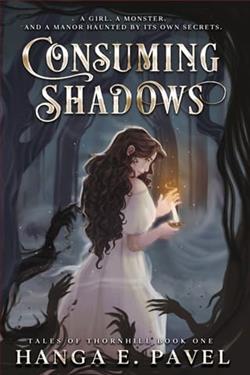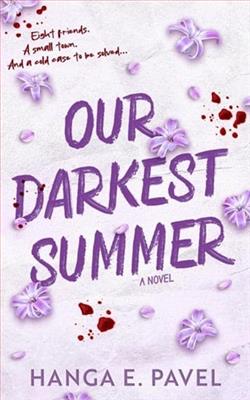Page 40 of A Dark and Stormy Night
"You died?"
"I was murdered."
"How . . . ? Why . . . ?" Her distress gave me a real comfort.
No one had ever asked me my story. Most people had never seen me. The ones who did . . . had their own problems. How to tell this girl, sheltered by her family, by school, by time, about the difficult days of the thirties when I grew up? To me, she was a child. A lovely child, bright with promise, but a child nevertheless. How to make her understand without scarring her? I picked my words carefully. "It was the beginning of the war, but more than that, it was the end of the Great Depression. People had starved. Men had been unable to support their families. They had run away from the shame. They had killed themselves — a coward's way out, but sometimes fear can last too long and all the world is dark and hopeless. Children were orphaned. Women — daughters and wives — were left alone to fend for themselves. They were prey to bad men who roamed the country, shysters and opportunists who saw them as targets."
"Heartbreaking times," Areila said.
"Yes. After I finished training, I got my orders. I would be fighting the war in Europe. I had ten days free before I was due to ship out. I took the fastest way home I could find, via freighter to Port Angeles." He had been so close. "But we ran into a winter storm and we had to dock in Virtue Falls. The crew intended to spend the night in the harbor's safety, get a warm meal and a dry bed. I told them I had no time to wait, that I would try to hitch a ride to Port Angeles. They wished me luck and told me if I wasn't able to get a ride, to return to the dock and they would gladly take me to my destination."
"That was so nice!" She smiled.
That womanly smile steadied me, prepared me to tell her of the remembered horror ahead. "At that time, civilians would do anything to help a soldier going off to war."
"As it should be."
"I came into town. Right away, I found a ride, a trucker heading to Port Angeles with a load of lumber. While I waited, he bought me a hot meal and when I asked, told me I had time to purchase some flowers. My darling loved flowers, and I dreamed of how I would kneel before her and beg her forgiveness."
Areila's eyes widened and she shrank back. "Are you okay?"
I realized my sorrow, the regret of a restless, doomed spirit, rang in my voice. Prudently I moderated my tone. "I am fine." For someone who is dead. "The events I recall do try my very soul."
She started to stand. "Do you not want to . . . ?"
"No, please!" I extended my hand.
She stared at it, reached to grasp it.
I snatched it away. "No. I forgot."
She repeated my earlier words. "You can't grasp or touch."
"Never. Much to my regret." And to the regret of those murdered women.
As if it was armor, Areila tightened her raincoat. She seated herself again and prompted, "Did you find your darling's flowers?"
"I did, in a little greenhouse outside of town. When the lady knew what I wanted, she gladly gave all her late blossoms to me."
"Because civilians would do anything to help a soldier going off to war," Areila repeated.
"It was evening as I returned to the harbor. I hurried; I had to hurry to catch my ride. But I saw a young woman living on the beach, facing the winter storms alone, fishing and hunting, barely surviving. A man attacked her. I saw it. A man with a knife. I had no weapon. I had to get to my love." If I could have cried tears, I would have. "But I couldn't let him murder that woman, that stranger. I ran at him, waving and shouting. I meant to frighten him away. Instead he killed me. Then he killed her."
Areila put her fist to her mouth.
I continued, "He stripped me of my uniform, cut my face to ribbons, left me in my underwear, made it appear she and I had murdered each other. No one in Virtue Falls knew any difference. In their eyes, we were vagrants and they buried us in this cemetery in paupers' graves." I thought about what Areila had told me earlier — that all the graves had been moved except mine. "I have never seen the murdered woman's spirit . . . I suppose her body is no longer here."
"No. I suppose not." Areila pushed her hair off her forehead. "My God. What a tale of murder and injustice. I wish I could help. How can I help?"
The concern was sincere, the offer genuine.
"You have helped. You allowed me to tell my story."
"That's not helping. That's listening."
Although she rated her listening as nothing, it had value to me, this soul that had been too long alone. "Perhaps you'll pray for me to be released from my purgatory, and pray that sometime, somewhere I will be reunited with my love."
"I'll pray for you both. What was your love's name?"















